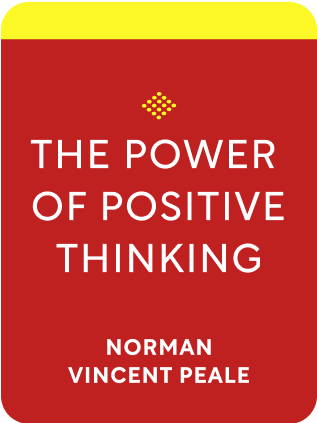

This article is an excerpt from the Shortform book guide to "The Power of Positive Thinking" by Norman Vincent Peale. Shortform has the world's best summaries and analyses of books you should be reading.
Like this article? Sign up for a free trial here .
Are you looking for The Power of Positive Thinking quotes? What are some of the most noteworthy passages worth revisiting?
In his book The Power of Positive Thinking, Norman Vincent Peale says there is no problem or obstacle you can’t overcome with faith, positive thinking, and prayer. He outlines the practical techniques of applied Christianity to help you take control of the events in your life rather than be directed by them.
Below is a selection of The Power of Positive Thinking quotes and passages.
The Power of Positive Thinking: A Practical Guide to Mastering the Problems of Everyday Living
In his book The Power of Positive Thinking, Norman Vincent Peale shows you how to believe in yourself, harness the power you need to reach your goals, and live a fulfilling life—all with the help of faith.
The following The Power of Positive Thinking quotes highlight some of his key ideas.
“Our happiness depends on the habit of mind we cultivate.”
According to Peale, happiness is a choice, not a by-product of circumstance. The key to choosing happiness is to cultivate what he calls a “happiness habit. Here’s how:
- Think happy thoughts. Make a mental list of happy thoughts and run them through your mind throughout the day. If an unhappy thought pops in, for example, you fear that things won’t go well for you that day, eject it by substituting a happy thought—things will go well for you.
- Start your day happy. The morning sets the stage for happiness throughout the day. Before you get up, picture happy experiences the day will bring for you. Peale recommends saying this Psalm (118:24) out loud: “This is the day the Lord has made; let us rejoice and be glad.” He says to personalize it—“I will rejoice.” As you are getting ready, tell yourself it is going to be a great day
- Show happiness in actions and attitudes. Throughout the day, continue with actions and attitudes that promote happiness. Showing others compassion and love is a basic principle of happy living. In other words, practicing love helps to create happiness.
“YOU DO NOT need to be a victim of worry. Reduced to its simplest form, what is worry? It is simply an unhealthy and destructive mental habit.”
Just like happiness, worry is also a habit, according to Peace. And because you can change any habit, you can break the worry habit and live more freely and happily. There are 3 steps to this process:
1. Believe you can: The first step to banishing worry is to believe you can. With God’s help, you can do whatever you believe you can do.
2. Empty your mind: Emptying your mind is important because fearful thoughts can clog your thinking. The five minutes right before you go to sleep are particularly important because the mind will absorb the last ideas you’re thinking while conscious.
- To empty your mind, visualize yourself actually emptying your mind of your worries and anxieties. You can think of it as emptying a bathtub after removing the stopper, or you can imagine reaching into your mind and plucking out the worries one by one.
- As you do this visualization, repeat an affirmation along the lines of, “I’m emptying my mind of all worry, fear and anxiety with God’s help.” Repeat this slowly five times.
- After you repeat this five times, add a new affirmation such as: “My mind is now emptied of all fear, worry and anxiety.” Repeat this affirmation 5 times, while visualizing your mind as empty of these negative emotions.
- Thank God for releasing your worries and go to sleep. Repeat this exercise three times a day: midmorning, midafternoon, and bedtime. This process works because visualizing yourself as free from worry will eventually lead to actually being free from worry.
3. Refill your mind with positive thoughts. Since your mind won’t stay empty for long, you must refill it with positive thoughts of faith and hope. Repeat a calming affirmation such as this: “God is filling my mind with peace and hope, protecting me and my family from harm. God will guide my decisions.” Do this six times a day. When you fill your mind with faith, there won’t be any room left over for fear.
“When you expect the best, you release a magnetic force in your mind which by a law of attraction tends to bring the best to you.”
When you expect the best in life, you get the best. When you expect the worst, that’s what you get. When you change your mental habits to a state of constant belief instead of doubt, everything becomes possible. When you embrace the power of belief, things that seemed impossible before move into the area of the possible.
Peale teaches a spiritual power technique that allows faith to take hold, enabling us to expect the best and put our whole hearts into what we want to accomplish. The crux of the method is faith, illustrated by the verse mentioned above, Mark 9:23, which says “all things are possible to those that believe.”
This method involves reading the New Testament and noticing how many times faith is mentioned. Choose about a dozen strong statements about faith—whichever appeal most to you (and there are many). Memorize each of these faith statements, saying them over and over again, allowing them to sink into your subconscious mind. As suggestions, in addition to the Mark 9:23 verse, there is also Matthew 17:20: “If you have faith, nothing will be impossible to you,” and Matthew 9:29, “According to your faith, be it unto you.”
When you’ve embraced the power of belief, you’ll have a new capacity to get what you truly want from life.
“Personally, I believe that prayer is a sending out of vibrations from one person to another and to God. All of the universe is in vibration. There are vibrations in the molecules of a table. The air is filled with vibrations. The reaction between human beings is also in vibration. When you send out a prayer for another person, you employ the force inherent in a spiritual universe. You transport from yourself to the other person a sense of love, helpfulness, support—a sympathetic, powerful understanding—and in this process you awaken vibrations in the universe through which”
Everything in the universe is made up of vibrations. Prayer is simply sending out vibrations to God as well as from one person to another. When you pray for someone else, you are sending that person a sense of support, love and helpfulness. This process awakens vibrations in the universe, and God is able to help make whatever you’re praying for come to pass.
Peale has made it a habit to send out prayers all day long to the people he encounters, even briefly, letting the power of God move through him, to the people he prays for, and back again to God, creating an endless loop of prayer power.

———End of Preview———
Like what you just read? Read the rest of the world's best book summary and analysis of Norman Vincent Peale's "The Power of Positive Thinking" at Shortform .
Here's what you'll find in our full The Power of Positive Thinking summary :
- That there is no problem or obstacle you can’t overcome with faith, positive thinking, and prayer
- The practical techniques of applied Christianity
- How to take control of the events in your life rather than be directed by them






